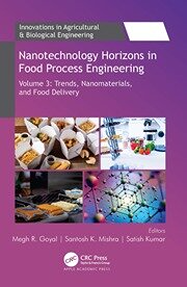Nanotechnology Horizons in Food Process Engineering
Material type: TextLanguage: English Series: Innovations in Agricultural and Biological EngineeringPublication details: Palm Bay, FL : Apple Academic Press, c2023Edition: 1stDescription: xxxv, 423 p. : illISBN:
TextLanguage: English Series: Innovations in Agricultural and Biological EngineeringPublication details: Palm Bay, FL : Apple Academic Press, c2023Edition: 1stDescription: xxxv, 423 p. : illISBN: - 9781774910986
- 664 GOY
| Item type | Current library | Shelving location | Call number | Copy number | Status | Date due | Barcode |
|---|---|---|---|---|---|---|---|
 Reference Collection
Reference Collection
|
Seminar Library | Department of Food Engineering | 664 GOY | 2022-23 | Available | 98273 |
Megh R. Goyal, PhD, PE, is a Retired Professor in Agricultural and Biomedical Engineering from the General Engineering Department in the College of Engineering at the University of Puerto Rico–Mayaguez Campus. He was proclaimed as the “Father of Irrigation Engineering in Puerto Rico for the twentieth century” by the ASABE, Puerto Rico Section, for his pioneering work on micro irrigation, evapotranspiration, agroclimatology, and soil and water engineering. A prolific author and editor, he has written more than 200 journal articles and several textbooks and has edited over 100 books.
Santosh K. Mishra, PhD, is an Assistant Professor in the Department of Dairy Microbiology at the College of Dairy Science and Technology at Guru Angad Dev Veterinary and Animal Sciences University, Ludhiana, Punjab, India. He has served in the dairy industry as a Quality Assurance Executive at Mother Dairy, New Delhi, and has handled several externally funded projects. He has published research, review, and popular articles in national and international journals as well as several book chapters and teaching reviews in various training programs.
Satish Kumar, PhD, is an Assistant Professor (Food Science and Technology) at the College of Horticulture and Forestry at Dr. Y. S. Parmar University of Horticulture and Forestry in Himachal Pradesh, India. Dr. Kumar served at Lovely Professional University, Phagwara-Punjab, India, as Assistant Professor (Food Technology and Nutrition). He has participated in several national and international conferences, seminars, workshops, training, symposiums, etc. He has to his credit research papers, book chapters, conference papers, and abstracts.
v. 3. Trends Nanomaterials and Food Delivery
SUMMARY:
Although nanotechnology has revolutionized fields such as medicine, genetics, biology, bioengineering, mechanics, and chemistry, its increasing application in the food industry is relatively recent in comparison. Nanotechnology in the food industry is now being explored for creating new flavors, extending food shelf life, and improving food protection and nutritional value, as well as for intelligent nutrient delivery systems, “smart” foods, contaminant detection nanodevices and nanosensors, advanced food processing, antimicrobial chemicals, encapsulation, and green nanomaterials.
This new three-volume set addresses a multitude of topical issues and new developments in the field. Volume 1 focuses on food preservation, food packaging and sustainable agriculture, while Volume 2 looks at nanotechnology in food process engineering, applications of biomaterials in food products, and the use of modern nanotechnology for human health. The third volume explores the newest trends in nanotechnology for food applications and their application for improving food delivery systems.
Together, these three volumes provide a comprehensive and in-depth look at the emerging status of nanotechnology in the food processing industry, explaining the benefits and drawbacks of various methodologies that will aid in the improvement and development of food product sourcing and food hygiene monitoring methods.
Volume 3: Trends, Nanomaterials and Food Delivery provides an overview of the current trends in nanotechnology for food applications and food delivery systems. Topics include a collection of chapters on diverse topics, including the stability of nanoparticles in food, nanobiosensing for the detection of food contaminants, nanotechnology applications in agriculture, the role of nanotechnology in nutrient delivery, how nanotechnology is applied in dairy products, biofunctional magnetic nanoparticles in food safety, the development of nutraceuticals using nanotechnological tools, and more.
